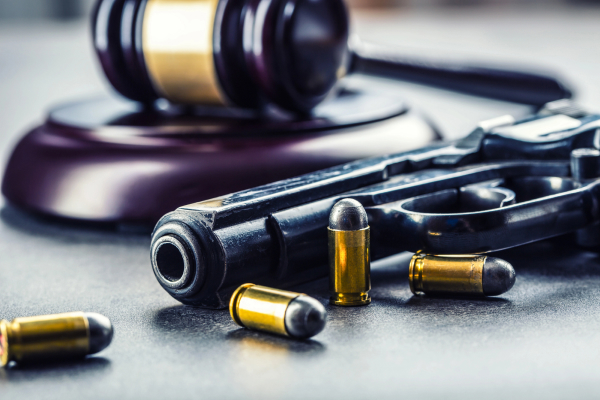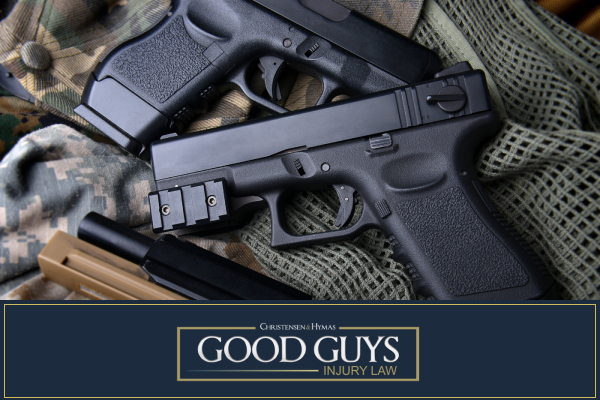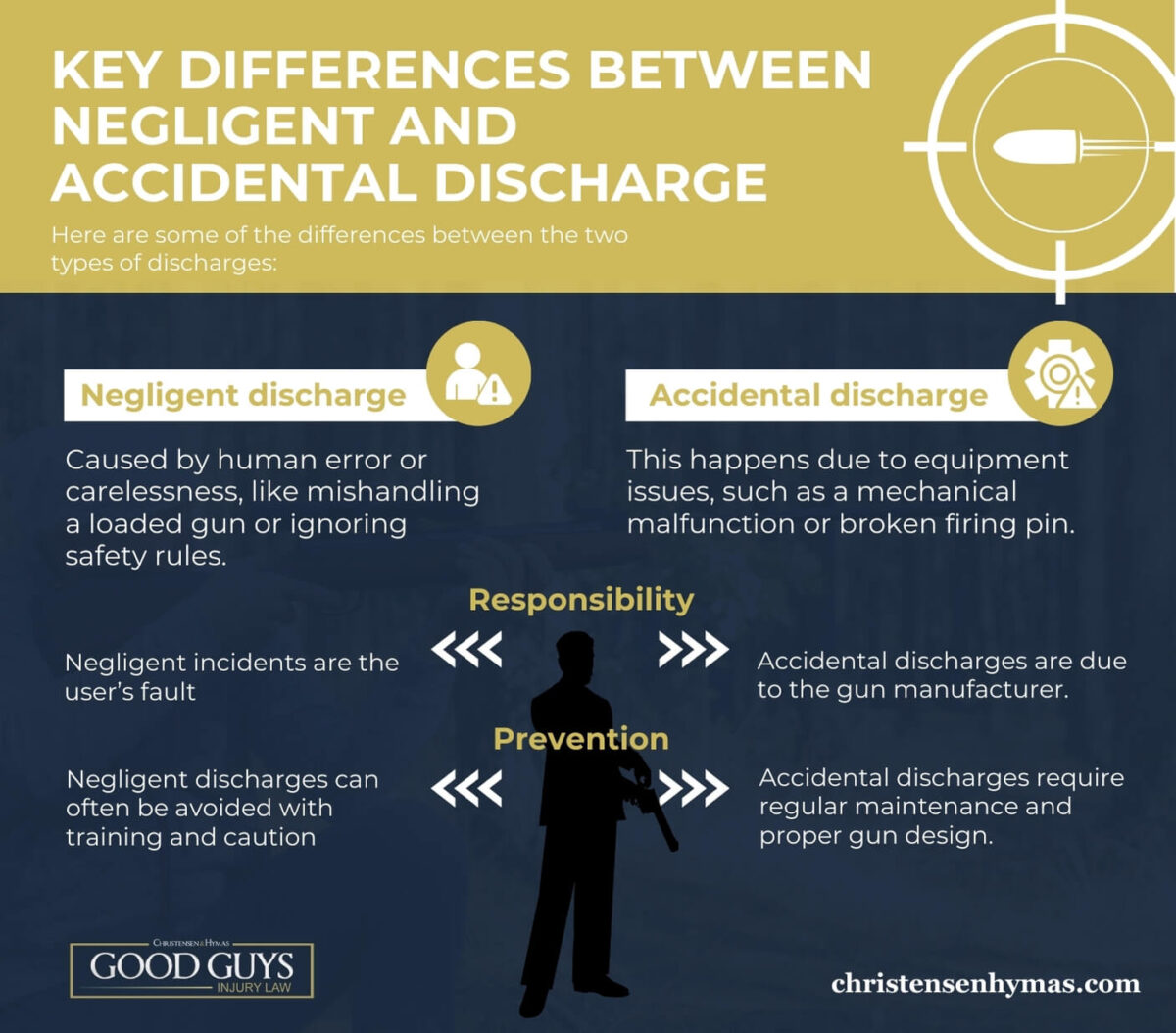
Gun discharges can cause serious injuries or property damage. Understanding the difference between negligent discharge and accidental discharge is crucial. These incidents may seem similar but involve very different causes. A negligent discharge happens due to carelessness, while an accidental discharge often involves mechanical issues or unexpected events.
Good Guys Injury Law helps victims injured by unintentional discharges seek justice. Whether the incident was caused by criminal negligence or an equipment malfunction, our team works to recover compensation for medical bills, lost wages, and emotional harm.

Looking for a Personal Injury Attorney? Contact Good Guys Injury Law Today!
Table of Contents
Definition of Negligent Discharge
A negligent discharge happens when a gun is fired due to carelessness or failure to follow safety rules. This type of incident is preventable and usually involves human error. Negligence often results from handling a loaded gun improperly or ignoring basic firearm safety measures.
Here are some key details about how a negligent discharge occurs:
How Negligent Discharge Results From Carelessness
A negligent discharge happens when a person fails to handle a gun responsibly. This often occurs when basic gun safety practices are ignored, such as failing to keep a finger off the trigger or not using the trigger guard properly. Handling a loaded gun without caution significantly increases the risk of firing unintentionally.
Many incidents occur because the user does not follow safety rules, like ensuring the firearm is pointed in a safe direction. Negligent discharges can also result from leaving a gun unsecured, allowing untrained individuals or children access to it. These acts of carelessness can lead to injuries, property damage, or worse.
By practicing strict firearm safety and treating every gun as if it’s loaded, most negligent discharges can be avoided. However, when such negligence occurs, victims have the right to seek compensation for the harm caused.
Legal and Safety Implications of Negligent Gun Use
The consequences of a negligent discharge are serious. Victims of these incidents can suffer injuries, property damage, or even death. Legally, the person responsible for the negligent discharge can face lawsuits and legal ramifications, including fines or criminal charges. In some cases, their actions may be classified as criminal negligence, leading to harsher penalties.
Safety is also a major concern. A negligent discharge occurs when someone disregards basic safety rules, putting others at risk. These incidents often highlight the importance of proper training and education on firearm safety. Gun owners must always secure their weapons and handle them responsibly.
Examples of Negligent Discharge in Various Contexts
- At home: Cleaning a gun without unloading it first can cause a negligent discharge, leading to injuries or property damage.
- In public: Mishandling a gun at a gun store or shooting range can result in accidents that endanger bystanders.
- Hunting: Failing to follow safety rules while hunting can cause a gun to fire unintentionally, harming others in the area.
- Around children: Leaving a loaded gun unattended allows untrained individuals to accidentally fire it.
Definition of Accidental Discharge

An accidental discharge occurs when a gun fires due to an unexpected event, like a mechanical malfunction or a problem with the gun’s design. Unlike a negligent discharge, it is not caused by carelessness but rather by factors beyond the user’s control.
When Mechanical Malfunctions Lead to Accidental Discharges
An accidental discharge can happen when the gun does not work as it should. Sometimes, parts like the firing pin or trigger break or get stuck. These problems are called mechanical malfunctions and can cause the gun to fire without warning.
For example, a mechanical failure might happen if the gun’s safety does not work or if the trigger moves on its own. Even if the person is careful, these issues can make the gun dangerous. Guns need regular checks and maintenance to avoid equipment malfunctions.
If an accidental discharge occurs because of a faulty gun, the maker might be responsible. Victims of such incidents may have the right to seek compensation for their damages or serious injuries caused by the malfunction.
Differences Between Human Error and Equipment Failure
A negligent discharge happens because of human mistakes, while an accidental discharge is caused by equipment problems. Human error includes not using the trigger guard, ignoring safety rules, or mishandling a loaded gun. These actions are preventable with proper training and care.
On the other hand, accidental discharges happen when the gun itself fails. This could be due to a mechanical malfunction, like a broken firing pin or a faulty safety. These problems can happen even if the person is being very careful.
Knowing the difference is important when seeking legal help. If a person’s carelessness caused the issue, they could be held responsible. If the gun maker is at fault, they may owe compensation for damages caused by their product.
Scenarios Where Accidental Discharges Are Most Common
Accidental discharges often happen during everyday activities with guns. For example:
- Cleaning guns: If the gun has a hidden problem, it could fire while being cleaned.
- Carrying guns: A loaded gun might fire if a part, like a trigger, gets caught on clothing.
- At the shooting range: A gun might fire unexpectedly due to a mechanical failure or a foreign object inside the weapon.
These incidents can cause serious harm even when the person is careful. Regular checks and repairs help prevent these problems. Victims of accidental discharges may be entitled to compensation if a gun’s defect caused their injuries.
Key Differences Between Negligent and Accidental Discharge

Here are some of the differences between the two types of discharges:
- Negligent discharge: Caused by human error or carelessness, like mishandling a loaded gun or ignoring safety rules.
- Accidental discharge: This happens due to equipment issues, such as a mechanical malfunction or broken firing pin.
- Responsibility: Negligent incidents are the user’s fault, while accidental ones may be due to the gun manufacturer.
- Prevention: Negligent discharges can often be avoided with training and caution, while accidental discharges require regular maintenance and proper gun design.
Identifying the cause helps determine liability and prevents future incidents.
Legal Implications of Gun Discharges

Both negligent discharges and accidental discharges can lead to serious legal problems. The responsible party may face legal consequences if someone is hurt or property is damaged. For a negligent discharge, the gun owner is often held accountable because the incident is caused by carelessness or ignoring safety rules.
In cases of accidental discharges, the gun manufacturer may be responsible if a mechanical malfunction caused the issue. Victims can file claims to recover damages for injuries, lost wages, and other losses. Knowing your rights and who is at fault is essential to seek proper compensation.
Civil Liability for Injuries or Damage Caused by Negligence
Both negligent discharges and accidental discharges can cause harm and lead to legal action. When a negligent discharge occurs, the person responsible for the gun is usually at fault. This is because carelessness or a failure to follow firearm safety rules often causes the incident. Legal consequences may include lawsuits, fines, or even criminal charges if someone is hurt.
The situation is different in the case of an accidental discharge. If the discharge happens due to a mechanical malfunction, the gun manufacturer could be held liable. Victims may file claims against the company to recover costs for medical treatment, property damage, or lost income.
Determining who is responsible is key in these cases. Victims of either type of discharge have the right to pursue compensation. Legal guidance ensures the responsible party is held accountable, helping victims recover from the incident.
How a Personal Injury Lawyer Can Assist in Gun Discharge Cases
When a gun fires, it can cause injuries or damage. If a negligent discharge happens, the person who handled the gun is usually at fault. This is because they may not have followed safety rules or handled the gun carefully. They could face legal trouble, like fines or lawsuits, if someone’s property is damaged or if someone gets hurt.
If an accidental discharge happens, the gun itself may be the problem. A mechanical malfunction, like a broken part, might cause the gun to fire. In these cases, the gun maker could be blamed. Victims can file a claim to get money for medical bills, lost wages, or repairs for damaged property.
It’s important to know who is responsible. Victims should get legal help to hold the right party accountable. This can help them recover from the harm caused by the discharge.

Contact Our Utah Personal Injury Lawyer for a Free Case Consultation

An unintended discharge often leads to injuries or damage. In the vast majority of cases, the person handling the gun is at fault for not following safety rules. A negligent discharge happens when carelessness or poor handling causes the gun to fire. In such an incident, the person responsible can face fines, lawsuits, or even criminal charges.
An unintentional discharge caused by a problem with the gun is different. The gun maker could be held accountable if a mechanical malfunction or defect caused the firing. Good Guys Injury Law has the experience needed to investigate these cases and identify who is responsible. We understand the challenges victims face and work hard to recover compensation for hospital bills, lost wages, and emotional suffering.
Getting legal help from Good Guys Injury Law can make sure the responsible party is held accountable and help victims recover from the harm caused by the discharge. Contact us today for a free case consultation.
